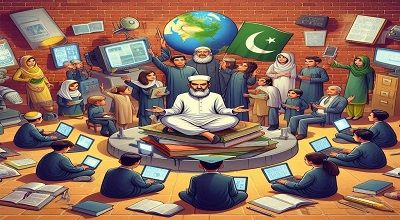Media Role in the Pakistan Education System
Now here, Media Role in the Pakistan Education System. The media plays a significant role in shaping public perception and influencing various aspects of society. Including the education system in Pakistan. Here are some key roles that the media can play in the context of Pakistan’s education system:
- Information Dissemination: Media can serve as a platform for disseminating information about educational policies, programs, and initiatives. This includes broadcasting important updates, such as changes in curriculum, examination schedules, and government policies related to education.
- Awareness and Advocacy: Media outlets can raise awareness about the challenges and issues within the education system. They can highlight problems like inadequate infrastructure, teacher shortages, and the quality of education. Which can mobilize public opinion and encourage advocacy for positive change.
- Promotion of Quality Education: The media can promote the importance of quality education and its long-term benefits. They can showcase success stories, innovative teaching methods, and best practices to encourage the pursuit of quality education.
- Accountability: Media can serve as a watchdog, holding educational institutions, government bodies, and policymakers accountable for their actions or inaction in improving the education system. Investigative journalism can uncover corruption, mismanagement, and other issues within the education sector.
- Public Engagement: Through programs, debates, and talk shows, the media can engage the public in discussions about educational reforms, policies, and challenges. This can lead to a more informed and engaged citizenry that actively participates in the improvement of education.
Read more…
- Student and Parent Guidance: The media can provide guidance to students and parents, offering information on educational opportunities, scholarships, and career choices. This can be especially valuable for students and parents who may not have access to other sources of information.
- Promotion of Cultural and Social Values: Media can help in promoting cultural and social values in education, fostering tolerance, diversity, and inclusivity. It can also encourage the preservation of local languages and traditions.
- Teacher Professional Development: The media can provide resources for teachers. Including educational content, training programs, and forums for sharing best practices.
- Dissemination of E-Learning Resources: In light of the COVID-19 pandemic, the media can play a crucial role in disseminating e-learning resources and helping students and teachers adapt to online learning platforms.
- Community Building: Media can help build communities of educators, parents, and students. Fostering collaboration and support networks that can improve the overall education system.
Note:
It’s important for the media to exercise responsible and ethical journalism to ensure. Its role in shaping the education system is positive and constructive. Collaboration between media, government, and educational institutions. Civil society can be an effective way to address the challenges and improve the quality of education in Pakistan.
